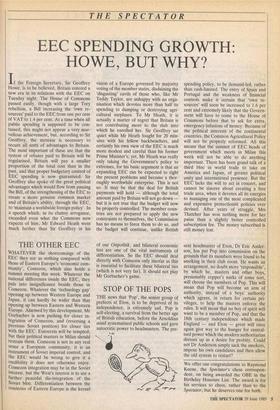THE SPECTATOR
EEC SPENDING GROWTH: HOWE, BUT WHY?
If the Foreign Secretary, Sir Geoffrey Howe, is to be believed, Britain entered a new era in its relations with the EEC on Tuesday night. The House of Commons passed easily, though with a large Tory rebellion, a Bill increasing the 'own re- sources' paid to the EEC from one per cent of VAT to 1.4 per cent. At a time when all public spending is supposed to be con- tained, this might not appear a very mar- vellous achievement, but, according to Sir Geoffrey, the increase is necessary to secure all sorts of advantages to Britain. The most important of these are that the system of rebates paid to Britain will be regularised, Britain will pay a smaller proportion of the total cost than in the past, and that proper budgetary control of EEC spending is now guaranteed. Sir Geoffrey also spoke of the great political advantages which would flow from passing the Bill, of the strengthening of the EEC to create a more genuine common market and of Britain's ability, through the EEC, to 'maintain a worldwide foreign policy'. In a speech which, in its clumsy arrogance, exceeded even what the Commons now expects of him, Mr Edward Heath went much further than Sir Geoffrey in his
vision of a Europe governed by majority voting of the member states, disdaining the 'disgusting' cavils of those who, like Mr Teddy Taylor, are unhappy with an orga- nisation which devotes more than half its spending to dumping or destroying agri- cultural surpluses. To Mr Heath, it is actually a matter of regret that Britain is not contributing more to the club into which he enrolled her. Sir Geoffrey sat quiet while Mr Heath fought for 20 min- utes with his fellow backbenchers, and certainly his own view of the EEC is much more Modest and careful than his former Prime Minister's; yet, Mr Heath was really only taking the Government's policy to extremes, for his basic argument is that an expanding EEC can be expected to right the present problems and become a thor- oughly worthwhile enterprise. This is not so. It may be that the deal for British payments will hold — although the total amount paid by Britain will not go down — but it is not true that the budget will now be properly controlled. The member coun- tries are not prepared to apply the new constraints to themselves, the Commission has no means to force them to do so, and the budget will continue, unlike British spending policy, to be demand-led, rather than cash-limited. The entry of Spain and Portugal and the weakness of financial controls make it certain that 'own re- sources' will soon be increased to 1.6 per cent and extremely likely that the Govern- ment will have to come to the House of Commons before that to ask for extra, emergency infusions of money. Because of the political interests of the continental countries, the Common Agricultural Policy will not be properly reformed. All this means that the summit of EEC heads of government which meets in Milan this week will not be able to do anything important. There has been grand talk of a third bloc in world trade to take on America and Japan, of greater political unity and international presence. But the EEC lacks the will to act in concert, and cannot be sincere about creating a free trade area, when it devotes all its energies to managing one of the most complicated and expensive protectionist policies ever devised. After years of struggle, Mrs Thatcher has won nothing more for her pains than a slightly better controlled subscription fee. The money subscribed is still money lost.


























































 Previous page
Previous page